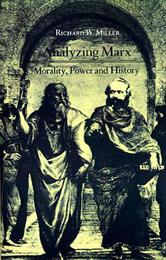
|
Analyzing Marx: Morality, Power and History
Paperback / softback
Main Details
| Title |
Analyzing Marx: Morality, Power and History
|
| Authors and Contributors |
By (author) Richard W. Miller
|
| Physical Properties |
| Format:Paperback / softback | | Pages:334 | | Dimensions(mm): Height 216,Width 140 |
|
| Category/Genre | History of Western philosophy |
|---|
| ISBN/Barcode |
9780691014135
|
| Classifications | Dewey:195 |
|---|
| Audience | | Professional & Vocational | | Tertiary Education (US: College) | |
|---|
|
Publishing Details |
| Publisher |
Princeton University Press
|
| Imprint |
Princeton University Press
|
| Publication Date |
21 September 1984 |
| Publication Country |
United States
|
Description
In this book Marx is revealed as a powerful contributor to the debates that now dominate philosophy and political theory. Using the techniques of analytic philosophy to unite Marx's general statements with his practice as historian and activist, Richard W. Miller derives important arguments about the rational basis of morality, the nature of power, and the logic of testing and explanation. The book also makes Marx's theory of change useful for current social science, by replacing economic determinist readings with a new interpretation in which systems of power relations are the basis of change. Part One discusses Marx's criticisms of the moral point of view as a basis for social choice. The outlook that emerges is humane but antimoral. Part Two argues that Marx' concepts of the ruling class is a means of measuring political power that is ignored yet urgently needed by present-day social science. Part Three bases Marx's theory of history on the dynamics of power, challenging both the standard, economic determinist readings of the theory and standard conceptions of science.
Reviews"This book offers a subtle, highly sophisticated, fresh and unfailingly interesting interpretation of some central themes in Marx's thought. Agreeably undogmatic, it has much to interest non-Marxist moral philosophers, political theorists and economists. Its aim is to elucidate some central claims of Marx in a way that will challenge non-Marxist assumptions. In this aim it admirably succeeds."-Steven Lukes, Oxford University
|